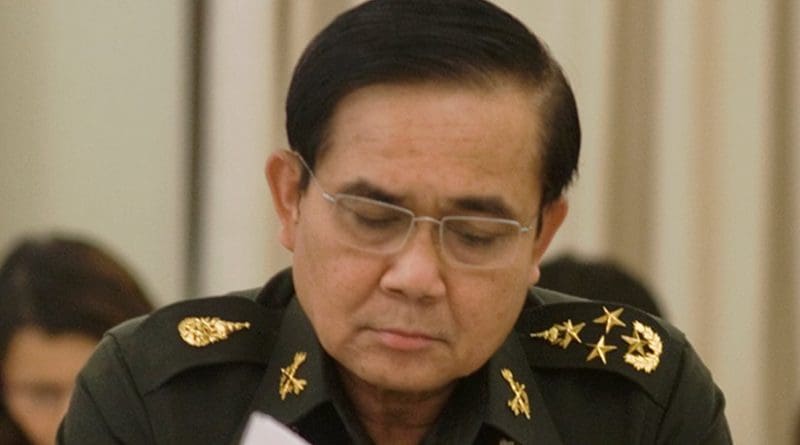Will Thailand’s Junta Ever Step Down? – OpEd
By Grace Guo
An old adage dictates that “once bitten, twice shy”. The 21st century version of that adage might very well carry the addendum “with the exception of Thailand’, a country that has seen more coup d’etats than democratic elections over the past 80 years. Indeed, it has been seventeen months since General Prayuth Chan-ocha seized power in Thailand, ousting the democratically elected government of Yingluck Shinawatra and promising to reinstate democratic elections in a matter of months. The 2007 constitution was thrown out and an interim statute hastily put into place. The only remnant of the old constitution is a chapter on lèse majesté, dealing with the illegality of insults, perceived or real, to a monarch or ruler.
Since taking power, Prime Minister Prayuth has made full use of lèse majesté, not to mention article 44 of his interim constitution – the article in question is referred to as the “dictator law”. This contentious bit of legalese grants the ruling junta absolute power over all branches of the government and their internal affairs. It is essentially a throttle on free speech, free opinion, free thought and of course, political opposition. The result – journalists have been silenced, activists gagged and political enemies have been detained and subjected to “attitude adjustments” or to put it in more precise terms – reeducation of the sort the world has seen before in the former Soviet Union, China or Vietnam.
In some cases, those in violation of rule 44 have vanished from public view. A case in point – former Energy Minister Pichai Naripthaphan, disappeared shortly after posting a message on Facebook saying that he had been summoned for “another attitude adjustment”. Human Rights Watch is calling for the immediate disclosure of his whereabouts.
And while the junta had promised to step down by the end of 2014, here we are nearing the end of 2015 with no sign of a new constitution, or anything resembling a democratic election on the horizon. Cunningly, Prayuth has tied the reversal to democratic rule to the passing of a new constitution meant to “restore happiness to the people” – a constitution was hashed out by military appointees, only to be subsequently rejected earlier in September by a different group of military appointees. In a failed bid to reassure the international community and the Thai people whose patience is wearing thin, Prayuth announced a mathematical algorithm (the 6-4-6-4 rule) corresponding to the number of months the junta will take to go through the motions of writing a new fundamental document, submitting it to public debate and organizing elections. This is the third postponement and extends the rule of the military government to 2017.
It is becoming increasingly clear that this scenario could drag on for some time. As long as the Thai people have the promise, somewhere in the future, of a democratic process in the offing, they seem content. The commitment to elections, sincere or not, is their assurance that the junta is merely temporary. However, common sense and historical fact dictate that once gained and held, power becomes increasingly difficult to wrest from those who hold it.
The rest of the world has reacted in a manner that has become the norm in such matters. The European Parliament has expressed its “concern at the deteriorating human rights situation in the wake of the illegal coup”. The parliament recently issued more rhetoric and a non-binding resolution calling for the utilization of “all available instruments to ensure respect for human rights and the rule of law in Thailand, in particular by continuing to observe investigations and trial hearings of opposition leaders”. What these instruments might be is not clear – economic sanctions perhaps.
Meanwhile, Human Rights Watch is voicing their disapproval, and the United Nations, as usual, has done all but nothing – with the exception of having Prayuth address the General Assembly on September 29th. At that gathering he madeno mention of the coup, nor did he say when a sense of normalcy would return to his country. Interestingly, the theme for the 70th General Assembly is “The United Nations at 70: the road ahead for peace, security, and human rights.”
Thailand’s woes seem to be under the radar of the rest of the world, and that oversight might be forgiven as it is a very busy time in history. News cycles are being consumed with more violent matters – a bloodless coup followed by encroachments on civil liberties do not lend themselves to a great deal of press.
And lest we forget, the US is busy in several hotspots around the globe, and have neither the means nor the political will to get mired in another mess in Southeast Asia. It might well be a different matter if oil was involved. Meanwhile, much of Europe is tied up dealing with the refuge crisis. Even Russia’s Vladimir Putin is preoccupied with setting things right in Syria.
For Thailand to return to a democratic state, the desire and drive will have to come from within, from the Thai people. Foreign intervention does not work, as has been evidenced and born out by history. As for Prayuth, seeing a very large image of his benevolent, smiling face over-looking an army concert at a Thai shopping mall, one can’t help but be reminded of none other than North Korea’s Kim Jong-Un.
And if the image isn’t scary enough, the thought of another Kim Jong-Un is.

